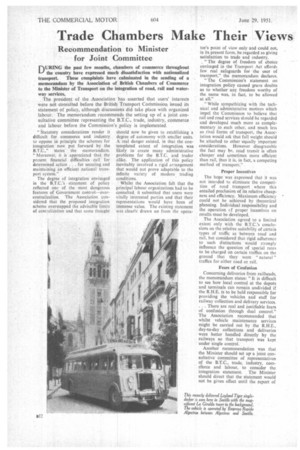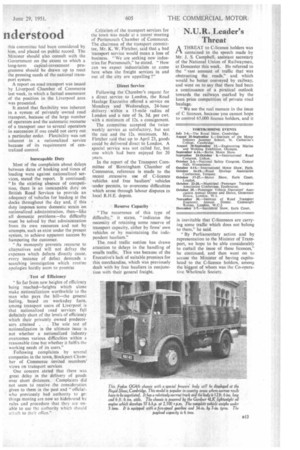Trade Chambers Make Their Views nderstood
Page 46

Page 47

If you've noticed an error in this article please click here to report it so we can fix it.
Recommendation to Minister for Joint Committee
DURING the past few months, chambers of commerce throughout the country have expressed much dissatisfaction with nationalized transport. These complaints have culminated in the sending of a memorandum by the Association of British Chambers of Commerce to the Minister of Transport on the integration of road, rail and waterway services.
The president of the Association has asserted that users' interests were not consulted before the British Transport Commission issued its statement of policy, although discussions did take place with organized labour. The memorandum recommends the setting up of a joint consultative committee representing the B.T.C., trade, industry, commerce and labour before the Commission's policy is implemented.
"Statutory considerations render it difficult for commerce and industry to oppose in principle the schemes for integration now put forward by the B.T.C.," states " the memorandum. " Moreover, it is appreciated that the present financial difficulties call for determined action . . . for securing and maintaining an efficient national transport system." The degree of integration envisaged in the B.T.C.'s • statement of policy reflected one of the most dangerous features of Government control—overcentralization. The Association considered that the proposed integration scheme overstepped the advisable limits of centralization and that some thought
should now be given to establishing a degree of autonomy with smaller units. A real danger existed, in that the contemplated extent of integration was likely to create many administrative problems for the B.T.C. and trader alike. The application of this policy inevitably involved a rigid arrangement that would not prove adaptable to the infinite variety of modern trading conditions.
Whilst the Association felt that the principal labour organizations had to be consulted, it submitted that users were vitally interested parties and that their representations would have been of immense value. The existing statement was clearly drawn tin from the opera tor's point of view only and could not, in its present form, be regarded as giving satisfaction to trade and industry.
. "The degree of freedom of choice envisaged in the Transport Act affords few, real safeguards for the user of transport," the memorandum declares.
"The Commission's statement on integration policy caused grave doubts as to whether any freedom worthy of the name was, in fact, to be allowed at al"
"While sympathizing with the technical and administrative motives which impel the Commission to believe that rail and road services should be regarded and developed much more as complementary to each other, and much less as rival forms of transport, the Association would ask that full weight should be attached to other equally important considerations. However disagreeable the fact may be. road transit is often cheaper and sometimes more efficient than rail, thus it is, in fact, a competing method of transport."
Proper Incentives
The hope was expressed that it was not intended to eliminate the competition of road transport where this entailed preclusion of its relative cheapness and efficiency. Maximum efficiency could not be achieved by theoretical planning. Individual responsibility and the operation cf proper incentives on results must be developed.
The Association agreed to a limited extent only with the B.T.C.'s conclusions on the relative suitability of certain types of traffic as between road and rail, but considered that rigid adherence to such distinctions would strongly influence the question of special rates to be charged on certain traffics on the ground that they were " natural " traffics for either road or rail.
Fears of Confusion
Concerning deliveries from railheads, the memorandum states: "It is difficult to see how local control at the depots and terminals can remain undivided if the R.H.E. is to be held responsible for providing the vehicles and staff for railway collection and delivery services. . . . There are real and justifiable fears of confusion through dual control." The Association recommended that whilst vehicle maintenance services might be carried out by the R.H.E., day-to-day collections and deliveries were better handled directly by the railways so that transport was kept under single control.
Another recommendation was that the Minister should set up a joint consultative committee of representatives of the B.T.C., trade, industry, cornnierce and labour, to consider the integration statement. The Minister should direct that the statement would not be given effect until the report of
this committee had been considered by him, and placed on public record. The Minister should also consult with the Government on the extent to which a long-term capital-investment programme should be drawn up to meet the pressing needs of the national transport system.
A report on road transport was issued by Liverpool Chamber of Commerce last week, in which a factual assessment of the position in the Liverpool area was presented.
It stated that flexibility was inherent in a system of privately ownecl road transport, because of the large number of operators and the automatic recourse of a transport user to several operators in succession if one could not carry out a particular order. Flexibility was not inherent in a nationalized service because of its requirement of cen tralized control. • Inescapable Duty Most of the complaints about. delays between dates of booking and times of loading were against nationalized services, stated the report. It continued: " In the existing absence of competition, there is an inescapable duly on British Road Services to provide an adequacy of vehicles for loading at the docks throughout the day and, if this duty imposes some domestic strain on nationalized administration, then—like all domestic problems—the difficulty must be solved by that administration from its own resources and not by attempts, such as exist under the present system, to achieve apparent success by hampering the customer.
"As monopoly prevents recourse to alternatives and will not defray the expenses which defects directly cause, every instance of defect demands a searching investigation which routine apologies hardly seem to promise.
„Test of Efficiency
"So far from new heights of efficiency being reached—heights which alone make nationalization worthwhile to the man who pays the bill—the general feeling, based on workaday facts, among transport users of Liverpool is that nationalized road services f0 definitely short of the levels of efficiency which their privately owned predecessors attained . . . The sole test of nationalization in the ultimate issue is not whether a nationalized industry overcomes various difficulties within a reasonable time but whether it fulfils thc working needs of its users."
Following complaints by several companies in the town, Stockport Chamber of Commerce invited members' views on transport services One concern stated that there was great delay in the delivery of goods over short distances. Complaints did not seem to receive the consideration given to them in the past and "official who previously had authority to get things moving are now so hidebutind by rules and procedure that they are unable to use the authority which should ancli to their office." Criticism of the transport services for the town was made at a recent meeting of Portsmouth Chamber of Commerce. The chairman of the transport committee, Mr. K. W. Fletcher, said that a bad transport service would mean a loss of business. 'We are seeking new industries for Portsmouth," he stated. "How can we expect industrialists to come here when the freight services in and out of the city are appalling ?"
Direct Service Following the Chamber's request for a direct service to London, the Road Haulage Executive offered a service on Mondays and Wednesdays, 24-hour delivery within a 15-mile radius of London and a rate of 5s. 3d. per cwt, with a minimum of 12s, a consignment.
The committee accepted the twiceweekly service as satisfactory, but not the rate and the 12s. minimum. Mr. Fletcher said that up to April 23, goods could be delivered direct to London. A special service was not called for, but one which had been enjoyed for 20 years.
In the report of the Transport Committee of Birmingham Chamber of Commerce, reference is made to the recent extensive use of C-licence vehicles and free hauliers' vehicles under permits, to overcome difficulties which arose through labour disputes in local R.H.E. depots.
Reserve Capacity "The recurrence of this type of difficulty," it states, "indicates the necessity of retaining some reserve of transport capacity, either by firms' own vehicles or by maintaining the independent hauliers."
The, road traffic section has drawn attention to delays in the handling of smalls traffic. This was because of the Executive's lack of suitable premises for this merchandise, which was previously dealt with by free hauliers in conjunction with their general freight.












































































































































